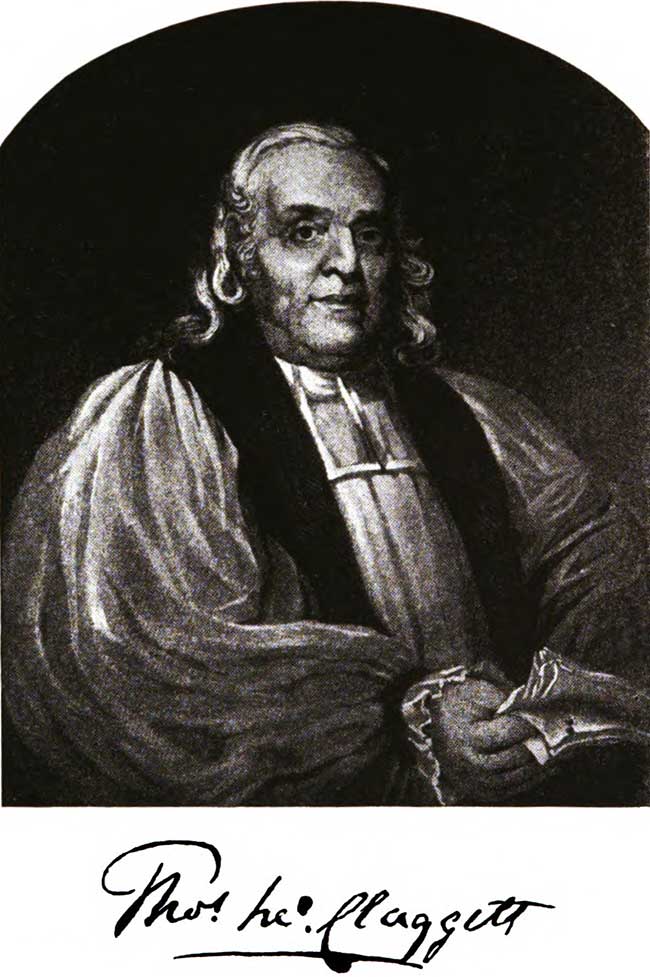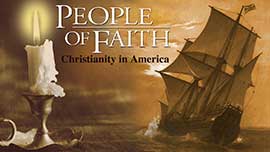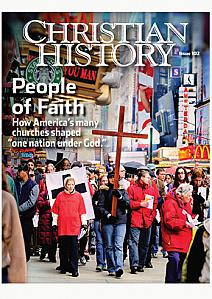PAIN AND SCARCE FUNDS DID NOT STOP CLAGGETT

[Above: Thomas John Claggett and his signature from Utley's The Life and Times of Thomas John Claggett: First Bishop of Maryland and the First Bishop Consecrated in America, 1913. Public domain.]
THOMAS JOHN CLAGGETT was a first. As a faithful follower of Christ at the founding of the United States, he had a unique opportunity. He became the first bishop of the Episcopal Church consecrated in the United States.
Born in 1743 in Maryland, Claggett was the son of a Church of England priest. (Although Maryland had been founded as a refuge for Roman Catholics, Protestants outnumbered Catholics.) Claggett’s father, Samuel, died when Thomas was about fourteen. A clergyman uncle educated the boy for three years, after which he attended a county school and then the College of New Jersey (Princeton).
Eager to serve in the church, Claggett returned to his uncle’s house to study theology. After preparation, he had to be ordained. However, the United States had no bishops of its own to perform an ordination. Therefore, in 1767, he sailed to England to receive ordination as a deacon and a priest. While in England he visited libraries and his Clagett cousins (the "Claggett" spelling was new to the American branch).
Shortly after he returned to Maryland in 1768, Claggett wrote to an English friend that many of the "shepherds" of Maryland’s churches were a shocking bunch. They were without abilities, sense of duty, or inclination to fulfill their responsibilities. “Oh, that your and my prayers for my success with poor dying sinners may in some measure be answered!” he wrote. Another letter said, “Religion here, my dear sir, is at a very low ebb; here is a large vineyard, with few, very few, honest & sincere laborers.” Claggett was one of the sincere laborers.
However, the American Revolution interfered with his efforts. Revolutionaries demanded that Church of England clergy take an oath of fidelity to the new nation. Claggett could not. At his ordination, like all other Church of England clergy, he had sworn to uphold the king. Although his sympathies were with his fellow Americans in the conflict with Britain, his conscience would not allow him to break his oaths. Claggett had to retire to his country property for two years.
However, by 1778, he was leading a church near his home. Following the Revolutionary War, he was among the clergymen who helped form the Episcopal Church that replaced the Church of England. Because English law did not allow English bishops to ordain clergy unless the clergy being ordained took an oath to the British king, one would-be bishop (Samuel Seabury) had to go to Scotland for consecration. Later, following a change in British law, English bishops consecrated additional American bishops.
On this day, 17 September 1792, Thomas John Claggett became the first Episcopal Church bishop of the United States consecrated by American bishops on American soil. The ceremony was held at Trinity Church, New York City. All four of the United States’ bishops participated: Samuel Seabury, William White, Samuel Provoost, and James Madison. The four who consecrated Claggett had all been consecrated in Scotland or in England.
After Claggett became bishop, he urged his clergy to hold high standards, to fulfill their duties, and to win souls. However, he labored from the start under serious adversities. For one, he was seldom paid his full salary and often was not even reimbursed for his travel expenses. Fortunately, he had some income of his own.
A bigger hindrance was ill health. By 1793, Claggett had developed rheumatism and other infirmities. Although he forced himself to push forward despite continual pain, he was increasingly incapacitated. Many of his letters beg readers to excuse his bad writing, as he was in such agony he could barely hold a pen. After twenty-four years of worsening health, Claggett died in 1816.
Francis Scott Key, an active Episcopalian and author of America’s national anthem, “The Star Spangled Banner,” wrote a Latin inscription for Claggett’s grave. Among its words of praise were these: “He ruled the church with firmness and faithfulness and adorned it by his character.”
—Dan Graves
----- ----- -----
Learn more about the rich tapestry of American denominations in the documentary People of Faith at RedeemTV.
[People of Faith can be purchased at Vision Video]
Or read Christian History #102, People of Faith








